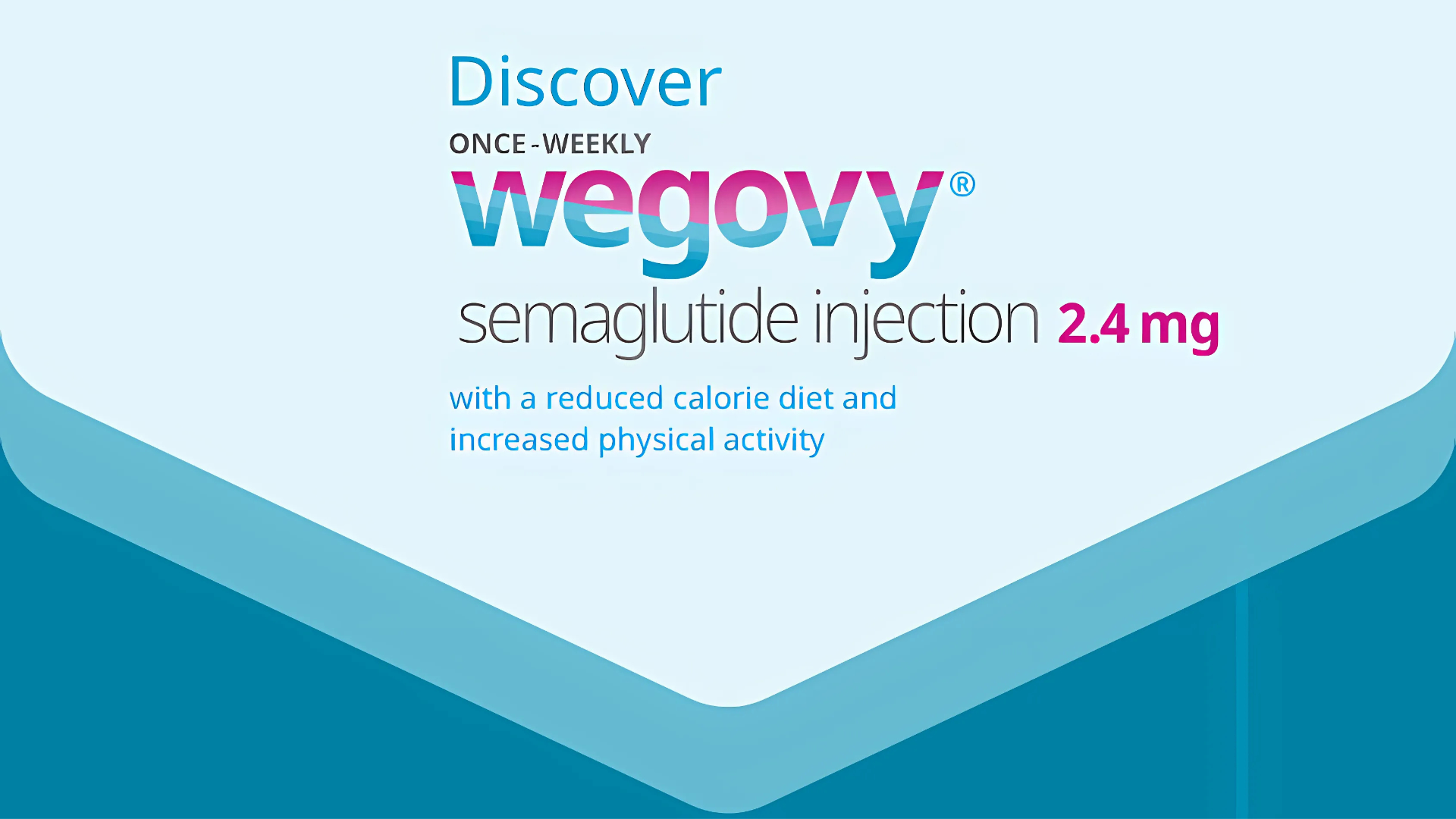
Valerie Shin
NP
Location : Los Angeles, CA, USA
BIO
Valerie Shin earned her Bachelor of Science in Nursing from New York University. After earning her degree, she advanced her nursing career with the Cleveland Clinic in Cleveland, Ohio, and the Veterans Affairs Medical Center in West Los Angeles, California. Valerie furthered her career by completing the Acute Care Nurse Practitioner program at the University of California, Los Angeles, where she obtained a Master’s degree. During her clinical rotation, she had the privilege of being mentored at the liver clinic, where she developed a strong interest in hepatology and the management of liver diseases. This experience led her to her current role as a Hepatology Nurse Practitioner at the Pfleger Liver Institute at UCLA Health, where she continues to specialize in liver disease care.
In addition to providing exceptional patient care, Valerie Shin has a strong passion for education, both in teaching future APPs and empowering her patients. She enjoys educating her NP students in her clinic and was honored with the opportunity to lecture NP students at UCLA School of Nursing on the topic of liver cirrhosis and its complications. Valerie also contributes to the annual UCLA Patient Seminar for Liver Diseases, where she provides essential patient education. Furthermore, she is actively involved in the GHAPP meetings, demonstrating her ongoing commitment to advancing both the education of current and future APPs and the care of liver disease patients.
MASLD-MASH Content Featuring Valerie
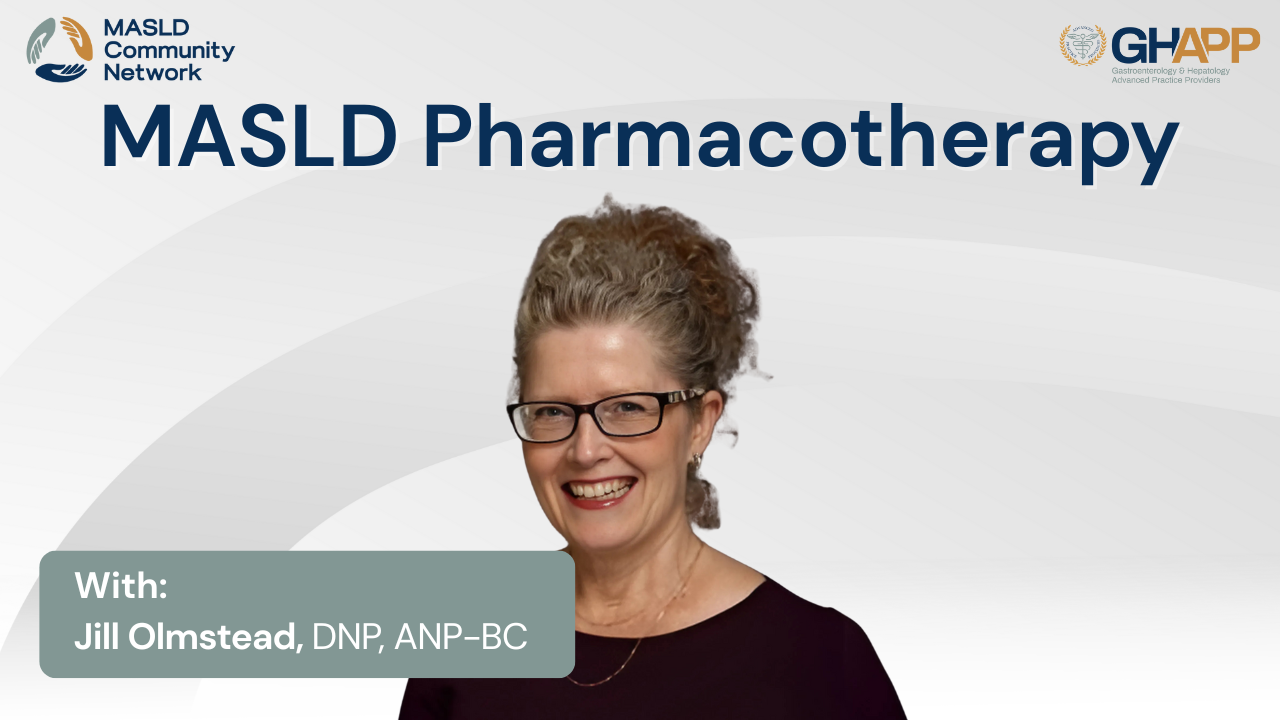
MASLD Pharmacotherapy With Jill Olmstead

Join Jill Olmstead, DNP from Providence Health for a practical, clinician-focused overview of MASLD pharmacotherapy and new treatment horizons for hepatic steatosis. This session in the GHAPP MASLD & MASH Community Network covers the shift in nomenclature, why care must be multidisciplinary (obesity, type 2 diabetes, dyslipidemia, hypertension, cardiovascular risk), and how to stage disease with FIB-4, noninvasive tests, and FibroScan before initiating therapy. Jill reviews lifestyle and weight-loss strategies, GLP-1 receptor agonists—their mechanisms, common GI side effects, and peri-procedure considerations due to delayed gastric emptying—plus where vitamin E and pioglitazone do and don’t fit today. She also walks through practical use of resmetirom for non-cirrhotic MASH with F2–F3 fibrosis (labs to order, monitoring, drug–drug interactions, and setting expectations alongside diet and exercise). If you’re a GI/hepatology clinician, APP, or primary-care partner looking to streamline risk reduction, staging, and evidence-based therapy for MASLD/MASH, this talk delivers step-by-step guidance you can use in clinic today.
Watch Now
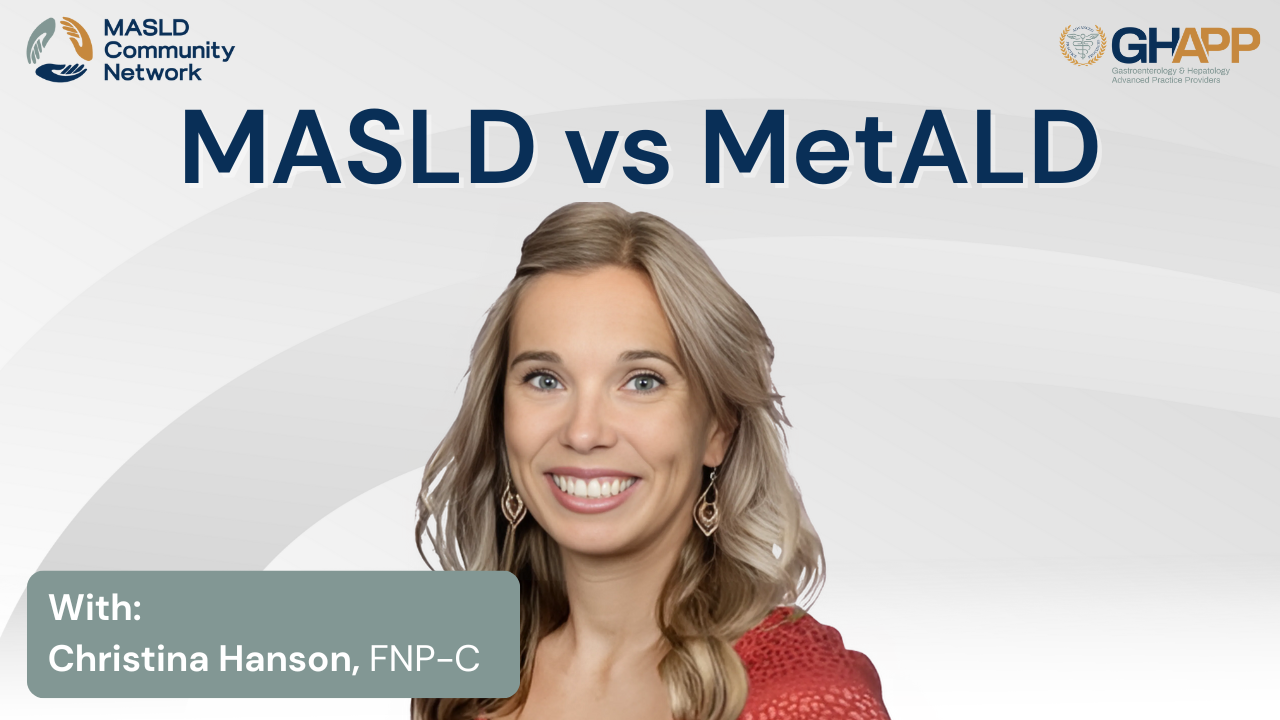
MASLD vs MetALD With Christina Hanson

Discover the latest insights on MASLD and MetALD in this educational session from the GHAPP MASLD Community Network. Christina Hanson, FNP-C, walks through a real-world case study to highlight how common metabolic conditions like hypertension, hyperlipidemia, obesity, and PCOS intersect with alcohol use to drive liver disease progression. The session explores updated nomenclature replacing NAFLD/NASH, the role of FibroScan and elastography in staging fibrosis, and the importance of screening patients with metabolic risk factors for fatty liver. Learn how alcohol consumption contributes to liver injury, triglyceride elevation, and blood pressure changes, and how objective biomarkers such as PEth testing are transforming diagnosis beyond self-reporting. Christina also reviews lifestyle interventions, dietary strategies like the Mediterranean diet, and current treatment considerations for patients with advanced fibrosis (stage 3), including when to initiate HCC screening. Whether you are a hepatologist, GI specialist, or advanced practice provider, this session provides practical tools for evaluating and managing patients with MASLD, MetALD, and related liver health challenges.
Watch Now
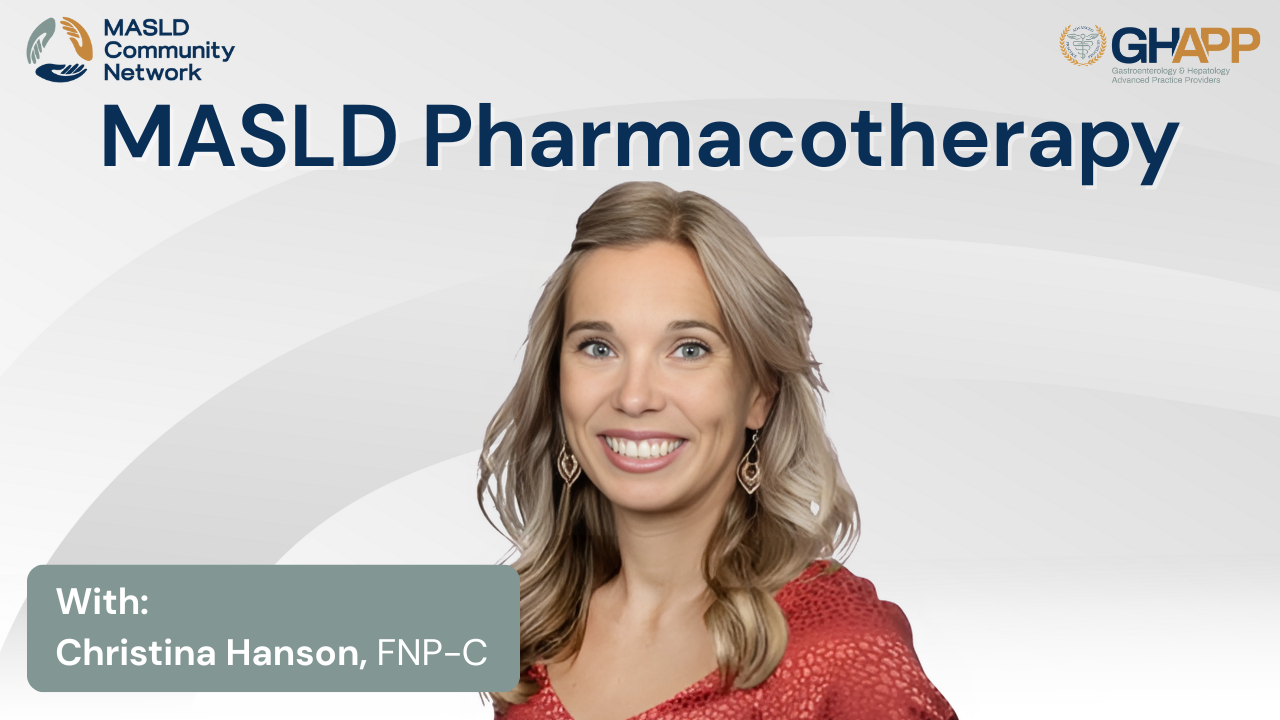
MASLD Pharmacotherapy With Christina Hanson

Learn about the latest advances in MASLD and MASH pharmacotherapy in this educational session from the GHAPP MASLD Community Network. Christina Hanson, NP, reviews the evolving landscape of treatment for metabolic dysfunction-associated steatotic liver disease (MASLD) and steatohepatitis (MASH), including the critical role of weight loss, cardiovascular risk reduction, and liver-directed therapies. The discussion covers current management strategies such as GLP-1 receptor agonists, bariatric interventions, statins, and lifestyle modification, while also exploring guideline-supported options like vitamin E and pioglitazone. Special attention is given to the first FDA-approved therapy for MASH, Resmetirom, including its mechanism, clinical trial results, safety considerations, and monitoring recommendations. Whether you are a hepatology specialist, primary care provider, endocrinologist, or advanced practice provider, this session highlights practical approaches to managing patients with MASLD and MASH and offers insights into emerging therapies that may shape future clinical practice.
Watch Now
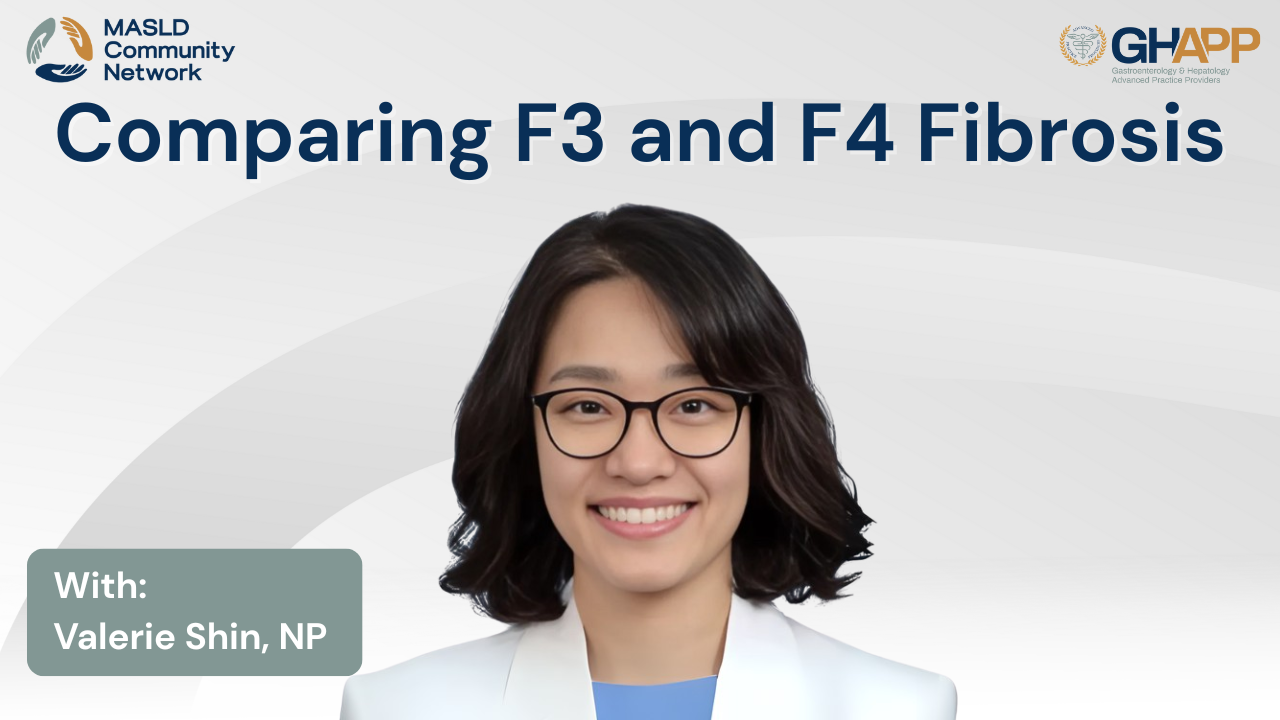
Comparing F3 and F4 Fibrosis With Valerie Shin

In this interactive case discussion, Valerie Shin, NP, from UCLA Health’s hepatology team, walks through how to compare F3 and F4 fibrosis in patients with metabolic dysfunction–associated steatohepatitis (MASH). Presented as part of the GHAPP MASLD Community Network series sponsored by Madrigal, this session uses real-world patient data to explore how non-invasive testing (NITs) like FibroScan, FIB-4, and ELF testing help stage liver fibrosis and guide treatment decisions. Valerie highlights the importance of accurate staging for prognosis, monitoring, and management—whether identifying patients with advanced fibrosis (F3) who may benefit from resmetirom (Rezdiffra), or recognizing progression to cirrhosis (F4) that requires enhanced surveillance and multidisciplinary care. This video also emphasizes practical strategies for lifestyle modification, metabolic risk factor control, and liver cancer screening. Whether you are a hepatology specialist, primary care provider, or advanced practice provider (APP), this case comparison offers valuable clinical insights into diagnosing and managing MASLD/MASH.
Watch Now
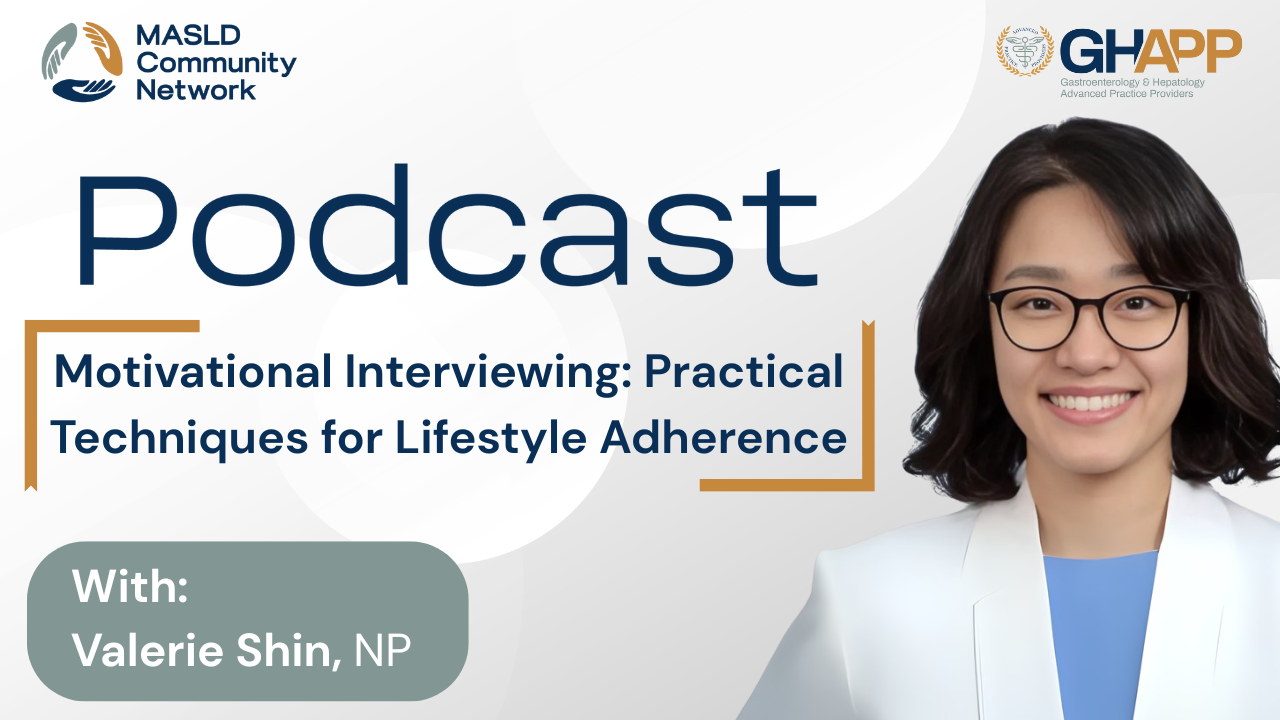
Motivational Interviewing: Practical Techniques for Lifestyle Adherence

Discover how motivational interviewing can transform the management of Metabolic Dysfunction-Associated Steatotic Liver Disease (MASLD) by empowering patients to make sustainable lifestyle changes. In this session, we explore why lifestyle modification—particularly achieving 5–10% weight loss—is the most effective intervention for MASLD, yet often fails when approached through traditional “diet and exercise” advice alone. Learn the four core principles of motivational interviewing—expressing empathy, developing discrepancy, rolling with resistance, and supporting self-efficacy—and how to apply them in real-world clinical encounters to improve patient engagement and outcomes. Through practical strategies, sample dialogue, and a compelling patient case study, this discussion highlights how small, achievable changes in diet and physical activity can reduce hepatic inflammation, improve insulin resistance, and even reverse fibrosis. Whether you’re a hepatology provider, primary care clinician, or allied health professional, you’ll gain actionable tools to activate patient motivation, overcome barriers, and support lasting behavioral change in MASLD care.
Watch Now

Common Questions From Community GI About MASH

In this MASLD Community Network episode, Valerie Shin, NP with UCLA Health Hepatology, addresses frequently asked questions from community GI providers about noninvasive tests (NITs) for assessing steatosis and fibrosis in MASLD and MASH. She reviews the benefits and key limitations of the FIB-4 score—highlighting the risk of false negatives in patients with normal AST/ALT levels, false positives in older patients, and inaccuracy when thrombocytopenia is unrelated to liver disease. Valerie explains when to consider second-line NITs, including transient elastography (FibroScan®), ELF score, and MR elastography, detailing their strengths, availability challenges, and technical limitations such as operator dependence, BMI restrictions, and insurance coverage issues. She also clarifies the rare but important role of liver biopsy when NITs produce conflicting or inconclusive results. Whether you’re a healthcare provider seeking practical diagnostic guidance or a patient wanting to understand your testing options, this video offers expert insights into selecting and interpreting noninvasive liver tests for MASLD and MASH.
Watch Now

MASLD Basics With Valerie Shin

Join Valerie Shin, NP, from the Pfleger Liver Institute at UCLA, for a foundational discussion in the GHAPP MASLD Community Network, sponsored by Madrigal Pharmaceuticals. This educational session covers the basics of steatotic liver disease (SLD), with a special focus on the evolving terminology and diagnostic criteria surrounding MASLD (Metabolic Dysfunction-Associated Steatotic Liver Disease) and MASH (Metabolic Steatohepatitis). Valerie explains why the shift away from the outdated “fatty liver” label is more than semantics—it removes stigma, increases diagnostic precision, and improves patient-provider communication. Through clear visuals and case-based discussion, this presentation outlines the global epidemiology of MASLD, how to classify disease etiology (MASLD, MetALD, ALD, or other rare causes), and how to risk-stratify patients using non-invasive tools like FIB-4, FibroScan, and ELF. Learn how to diagnose MASLD, when to refer to hepatology, how to use biomarkers for staging fibrosis, and when pharmacotherapy like resmetirom may be appropriate. With rising global prevalence and many patients progressing silently to cirrhosis or HCC, early detection and management are key. Don’t miss this practical, clinically grounded presentation designed for APPs and primary care providers managing patients with metabolic liver disease.
Watch Now

Management of Life Style Modification

This video focuses on the comprehensive management of patients with metabolic-associated steatohepatitis (MASH), emphasizing lifestyle modifications, dietary adjustments, and exercise strategies. Key topics include the importance of addressing risk factors like diet, exercise habits, and alcohol intake, as well as referrals to medically supervised weight loss clinics or bariatric surgery for advanced cases. The speaker highlights the benefits of the Mediterranean diet, intermittent fasting, and avoiding ultra-processed foods while discussing the role of resistance training to combat sarcopenia and maintain muscle mass. Practical advice and tailored recommendations ensure a holistic approach to managing MASH and improving patient outcomes.
Watch Now

Third Step of Life Style Management

This video provides a comprehensive overview of emerging pharmacologic treatments for metabolic-associated steatohepatitis (MASH) and their tailored applications based on patient profiles. Topics include FDA-approved therapies, drugs in advanced clinical trials (such as semaglutide and lanifibranor), and the potential for combination treatments targeting both steatohepatitis and fibrosis. The speaker emphasizes the importance of patient-specific approaches considering metabolic profiles, obesity, and diabetes status, alongside lifestyle interventions. Additionally, the video discusses the evolving interdisciplinary care model and highlights the exciting progress in non-invasive testing and treatment advancements for F2-F3 fibrosis.
Watch Now

Approved Medication for MASH/NASH

This video provides detailed guidance on selecting and monitoring patients for emerging therapies targeting advanced fibrosis (F2-F3) in NASH. Key topics include contraindications for patients with cirrhosis, considerations for concomitant medications, and dose adjustments for statins. The video outlines ideal candidates based on specific thresholds for VCTE, MRE, ELF scores, and other non-invasive tests while emphasizing the importance of ruling out portal hypertension and other liver diseases. It also reviews a stepwise monitoring approach, focusing on tolerability at three months and efficacy assessments at six and twelve months, with an emphasis on histologic and non-invasive test improvements.
Watch Now

Types of Diet for the Treatment of MASLD

This video explores comprehensive strategies for managing metabolic-associated steatohepatitis (MASH), focusing on fibrosis risk stratification, lifestyle modifications, and pharmacologic interventions. Learn about dietary recommendations like the Mediterranean diet, exercise guidelines emphasizing resistance training, and the role of intermittent fasting and processed food avoidance. The video also highlights weight loss targets, diabetes management, and emerging therapies such as GLP-1 receptor agonists and bariatric surgery, all aimed at improving liver health and patient outcomes.
Watch Now

NITs to Identify High Risk MASH Patients

Explore advancements in non-invasive diagnostics and risk stratification for liver fibrosis and MASH. This video highlights tools like FIB-4, transient elastography, and innovative scoring systems (e.g., FAST and Agile) to identify and predict outcomes for high-risk patients. Learn about serum biomarkers, updated guidelines, and the role of lifestyle interventions alongside targeted therapies for managing metabolic risks and advancing care in hepatology.
Watch Now











